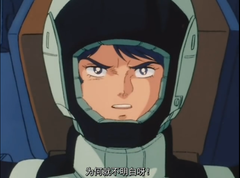Difference between revisions of "No zuo no die"
m |
m (adding or amending interlanguage links,如有错误请联系用户Bhsd) |
||
| (One intermediate revision by one other user not shown) | |||
| Line 14: | Line 14: | ||
While "{{lang|zh|作死}}"(zuòsǐ, sometimes pronounced as zuōsi) is a common Cantonese term that has the literal translation of "suicidal actions", the origin of this term is believed to be tightly associated with two lines of the episode 12 of the ''Mobile Suit Zeta Gundam''. The character in this episode, despite knowing dire consequences of remaining in the damaged "Mobile Suit" (manned robots, a fictional weapon system), did not try to evacuate himself, and received the following comments from his teammates: | While "{{lang|zh|作死}}"(zuòsǐ, sometimes pronounced as zuōsi) is a common Cantonese term that has the literal translation of "suicidal actions", the origin of this term is believed to be tightly associated with two lines of the episode 12 of the ''Mobile Suit Zeta Gundam''. The character in this episode, despite knowing dire consequences of remaining in the damaged "Mobile Suit" (manned robots, a fictional weapon system), did not try to evacuate himself, and received the following comments from his teammates: | ||
| − | {{cquote|{{Ruby|Resistance will simply get oneself killed; |抵抗すると无駄死にするだけだって}}<br />{{Ruby| Why can't they understand‽|なんで分からないんだ}}}} | + | {{cquote|{{Ruby|Resistance will simply get oneself killed; |抵抗すると无駄死にするだけだって|en|ja}}<br />{{Ruby| Why can't they understand‽|なんで分からないんだ|en|ja}}}} |
The phrase is translated into Chinese as "{{lang|zh|不作死就不会死,为什么不明白}}" and received widespread usage in [[Baidu Tieba]] by around 2011. As it spreads, the second half got dropped and the first half got shortened sometimes as "{{lang|zh|不作不死}}"; English and Chinglish translations soon arise, eventually solidifying into the Chinglish phrase '''"No zuo no die"'''. | The phrase is translated into Chinese as "{{lang|zh|不作死就不会死,为什么不明白}}" and received widespread usage in [[Baidu Tieba]] by around 2011. As it spreads, the second half got dropped and the first half got shortened sometimes as "{{lang|zh|不作不死}}"; English and Chinglish translations soon arise, eventually solidifying into the Chinglish phrase '''"No zuo no die"'''. | ||
| Line 40: | Line 40: | ||
</poem>'' | </poem>'' | ||
| − | [[zh: | + | [[zh:不作死就不会死,为什么不明白!]] |
[[Category:Idiomatic Phrases]] | [[Category:Idiomatic Phrases]] | ||
Latest revision as of 00:05, 11 November 2022
| Information | |
| Phrase | No zuo no die |
|---|---|
| Other statements | No zuo no die why you try |
| Origin | Mobile Suit Zeta Gundam |
| Related article(s) | People die if they are killedThis page does not exist in English Moegirlpedia yet. You may want to refer to this page on Chinese Moegirlpedia: 人被杀就会死. (zh:人被杀就会死), Resistance is futile |
"No zuo no die" is a Chinglish term. It is a word-by-word translation of "不作不死", a shortened form of "不作死就不会死", meaning "If you don't act stupid, you won't die". It is commonly used to comment on when obviously stupid or dangerous conducts has resulted in (known and anticipated) consequences. Although used predominantly by Chinese speakers, the term has a origin linked to the Japanese manga/anime series Mobile Suit Zeta Gundam (Japanese:機動戦士Ζガンダム) first published/aired in the 1990's.
Etymology
While "作死"(zuòsǐ, sometimes pronounced as zuōsi) is a common Cantonese term that has the literal translation of "suicidal actions", the origin of this term is believed to be tightly associated with two lines of the episode 12 of the Mobile Suit Zeta Gundam. The character in this episode, despite knowing dire consequences of remaining in the damaged "Mobile Suit" (manned robots, a fictional weapon system), did not try to evacuate himself, and received the following comments from his teammates:
The phrase is translated into Chinese as "不作死就不会死,为什么不明白" and received widespread usage in Baidu Tieba by around 2011. As it spreads, the second half got dropped and the first half got shortened sometimes as "不作不死"; English and Chinglish translations soon arise, eventually solidifying into the Chinglish phrase "No zuo no die".
Usage
Nowadays it is very popular a term online with the following established usages:
- Post as a warning or a "last-hit" (補刀) tsukomi with the meaning "if one doesn't do stupid things, they wouldn't come back and bite one in the ass. However if one does, they most certainly will."
- Used as a comment towards supporting characters or low-rank villains in animes who have antagonized the protagonist, which, due to the rational assumption that the protagonist will unlikely die, are likely to get their bentosThe page "bento(Idiom)" does not exist in English Moegirlpedia yet. You may want to refer to this page on Chinese Moegirlpedia: 领便当. (zh:领便当).
The term also sees its usage in describing certain online behavior (e.g. politically sensitive comments) that are known to be punished with thread deletion or account banning. With widespread censorship practices in mainland China, the usage of this term suggest the underlying dichotomy of hegemonic powers imposing such restrictions and everyday people under the influence of such. Under this context, the term is arguably not entirely negatively connoted.
Related Poem
The poem has no real meaning and ignores grammar; it's possible that it is composed only to rhyme.
No zuo no die, why you try;
No try no high, give me five.
Why try why high, can't be shine;
You shine you cry, still go die.
No zuo no die, don't be shy;
You shy, you die, you can try.
Keep try, keep shine, love that guy;
But he only say good night.

